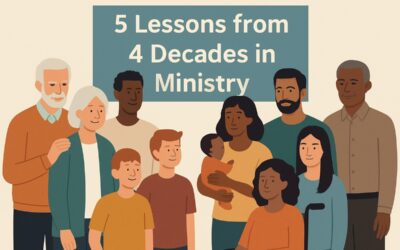Introduction
For thousands of years the Old Testament has transformed the lives of men and women, and it continues to transform mine. These Scriptures refresh, renew, and build my faith as I more clearly find my story in His story. Throughout the Scriptures “spiritual truth is fleshed out in historical reality as God reveals Himself in time and space.”[1] The Old Testament relates to my life, teaches me to rely on God, showcases “real” people, shows me the importance of remembrance, calls me to reverence, and renews my spiritual life.
Relevance
During the introductory syllabus review, Dr. Embry reminded me that this is a course on the Old Testament, not a course on books about the Old Testament. I need this reminder and must never substitute my love for reading books “about the Bible” for the Bible. The Word of God is alive and active (Hebrews 4:12), different from other books.
Numerous biblical themes came to life for me, enhancing my understanding of the narrative. I gained a deep appreciation for the importance of understanding the Old Testament in order to understand the New (Dr. Spawn, Introductory lecture). I cannot grasp God’s relentless love and pursuit for His wandering people, His plan for the Messiah, King of Kings, and High Priest, or the significance of Atonement without Old Testament background. As a result, I feel anew the thrill of the Scriptures as they instruct, encourage, and give me hope (Romans 15:4).
Reliance on God
The theme of reliance permeates throughout the Old Testament. When God’s people relied on Him, they were not disappointed; yet, they quickly became self-reliant, resulting in defeat and exile. This message rings loudly throughout the pages of the Old Testament.
In Genesis 15:8, after God reassures Abram that He will keep His promise to him, Abram asks God, “How can I know?” Then, in verse 9, God takes a self-maledictory oath as he passed through the carcasses. Though he did not tell Abram all the ways His promise would be fulfilled, in essence he tells him to just believe, don’t try to figure it out or “make it happen” (Dr. Spawn, Genesis lecture). As I walk through a difficult time of life watching my husband’s life fade away, I hold to God’s promises, because He is reliable. He was faithful to Abram, and He will be faithful to me.
I take to heart Moses’ words in Exodus 33:15, “If your Presence does not go with us, do not send us up from here.” God’s Presence is what distinguishes a people of God. They had the promises of God with them, but I cling to the promise of Christ in me, the hope of glory (Col 1:27). God has been transforming me and teaching me that I can do nothing on my own. I must continue to walk with God, relying on His Presence to lead me.
Dr. Embry’s presentation of Atonement, covered in his lecture on Leviticus, moved me as he described the way God’s Presence comes down into the center, but holiness, as a result, should spread out from the community. I realize that whenever my spiritual community lacks holiness, the Presence of God in the members’ lives must be re-examined. This necessitates honesty and courage, as I strive to help others re-prioritize God’s Presence in their lives. Arnold and Byer expressed the impact of an individual on community as they wrote, “In a real sense, the human dilemma finds its solution in God’s grace and the faith of Abraham…the faithful obedience of a single individual has universal significance.”[2] While I don’t compare myself to Abraham, one (including me) cannot over-estimate the effect their actions have on others in current and future generations. I want my faith and obedience to make a difference now and for future generations.
Ezekiel is an example of one who relied on God. I learned that God interrupted Ezekiel’s preparation for priesthood, which was no small thing. Spawn explained that while we may anticipate something to be the way we should go, like Ezekiel, God may be calling us to something else. But, Spawn continues, “Hang on…God has a way of surprising us and using our giftedness in a way that might surprise us” (Dr. Spawn’s lecture on Ezekiel). This encouraged me, as many of my plans have been interrupted by life’s circumstances.
As I read of the prophets and leaders who at times questioned God, Wilson’s words, “At the end of the day, God does not always provide a satisfying answer to the Why of human suffering. Rather, he provides himself”[3] were like balm to my soul. God’s Presence made all the difference for the Israelites (Dr. Embry, Exodus lecture). I ask myself how self-reliant vs. God reliant I am in my life. His Presence was enough for them and must be enough for me.
Real People
The “realness” of the Old Testament characters increases my faith. One just can’t make this stuff up. People sin, repent, and mess up again. They make excuses and get distracted. They distort the image of God, as expressed by Arnold and Byer: “So while Yahweh was creating a nation that would reflect his moral likeness, the Israelites were trying to create God in their image.”[4] God continually gets their attention through His discipline.
The characters of the Scriptures were real people, just like you and me, but God’s Presence in their lives gave them identity, belonging, and meaning. Amazingly, God loved these real, flawed people and saw something in them far beyond what they could see. Though they spurned His love again and again, He continually desired relationship with them. This encourages me, and calls me higher in my relationships. The emotions of these real people, such as “all the feels” expressed in the Psalter, Lamentations, and Job, help me grow in my vulnerability and trust with God, believing He cares for me just as he did for them.
Remembrance
How quickly one can forget the mighty deeds of God. I am struck by the many “reminders to remember” throughout the Old Testament. These are given through visuals (such as altars and stones), celebrations, accounts of God’s mighty deeds, genealogies, and songs of praise. Moses’ use of songs of remembrance and praise[5] reminds me of the importance of singing hymns and worship songs that praise Him and recount ways He has worked through the ages. I must remind the next generation of God’s mighty deeds of old as well as ways I see Him work in my life and times (Deut 6:1-9). Remembrance builds faith. The secret of spiritual living is the power to praise. Praise is the harvest of love. First, we sing; then we believe.[6] Praise and remembrance have become a greater part of my life.
Sometimes we need to remember God’s severity and sometimes his kindness (Rom 11:22). I need wisdom and prudence, like the Chronicler, to know what is appropriately needed. The Chronicler had a different purpose from the prophet’s purpose. Sometimes strong preaching is needed; yet, other times encouragement is needed. The Chronicler avoided all avenues that might detract from his main objective, which was to remind his readers of their heritage and to assure them of triumphs in the future (Chronicles lecture, Dr. Spawn). He knew that those who had gone back to Judah were “all too familiar with the failures of the past. They did not need to be reminded of the sin and punishment of their ancestors.”[7]I must remember all aspects of God, as this leads me to both His grace and truth.
Reverence
God is to be honored. The paradox concerning the kindness and severity of the Lord makes more sense as I view the continual cycle of the Israelite’s reverence for God and His Word followed by utter failure to honor Him and His laws.
Spawn’s lecture on Job encouraged me. His thoughts on the leviathan and behemoth (possibly representing God’s natural order and the unseen) instructed me as he explained that if one can’t understand God’s natural order, one has no hope in understanding the spiritually unseen. The fact that God’s plan is bigger than what I can see (Is 55:8-9) brings me peace. I cannot possibly understand God but can rely on His Goodness.
The Hebrew rabbinic word, kavanah, will help me better direct my focus toward revering God. Wilson explains the meaning as awareness of what one is doing so that they are inwardly turned toward God’s presence, offering one’s “words or actions as gifts upon an inner altar.”[8]
As a spiritual leader in my church, my reverence for God is crucial, affecting others as well as me. Leaders are necessary, but my faith must be deep enough to remember who my ultimate leader is. Any leader that points to self, more than God, is lacking and dangerous (Dr. Spawn’s lecture on Psalms).
Renewal
The need for spiritual renewal is constant. My faith must continue to be fresh and observable in order to pass it to future generations. Wilson said it well as he recounted the “God of our fathers” mentioned in Exodus 3:6. He pens, “The heritage of faith is not merely to be received passively as an heirloom from generations past but is to be personally encountered, won, and owned…Thus, to know God must not be perceived as sluggishly receiving some musty souvenir of fate. Rather, with the patriarchs, it embraces a fresh encounter of faith.[9]
God longs to transform lives. Arnold and Byer explain, “law is primarily not to inform the Israelites but rather to form them spiritually.”[10] He is patient with transformation, knowing His renewal plan in not instantaneous, but works through deep seated cultures of the day (Spawn’s lecture on Prophetic literature). I pray to let His words always renew and transform my heart and mind.
Conclusion
I thank God for the relevance of His Scriptures, as alive today as they were thousands of years ago. His promises remain as reliable now as they were to Moses, Abraham, and David. The real people of the Scriptures show me that God can work through me, as he did through them. As I remember the mighty deeds He has done, I know that He alone is worthy to be praised and revered. I pray my heart is continually renewed so that I can pass my faith on to the next generation. As Arnold and Byer penned concerning the laws, “But God intended these laws for worship, and their children were to learn them in anticipation of that future day when they would live in Canaan…a day that would certainly come.”[11] I, too, look forward to the final spiritual Canaan, a day that will surely come.
Bibliography
[1] Bill T. Arnold and Bryan E. Byer, Encountering the Old Testament, Third Edition (Grand Rapids, MI: Baker Academics, 2015), 42.
[2] Arnold and Byer, Encountering, 65.
[3] Marvin Wilson, Exploring Our Hebraic Heritage (Grand Rapids, MI: Eerdmans Publishing, 2014), 239.
[4] Arnold and Byer, Encountering, 82.
[5] Arnold and Byer, Encountering, 120.
[6] Wilson, Exploring, 221.
[7] Arnold and Byer, Encountering, 229.
[8] Wilson, Exploring, 223.
[9] Wilson, Exploring, 232.
[10]Arnold and Byer, Encountering, 118.
[11] Arnold and Byer, Encountering, 108.



0 Comments